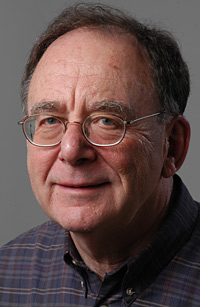-
(b.) - ?1935
Bio/Description
A computer scientist and computational theorist at the University of California, Berkeley, notable for research in the theory of algorithms, for which he received a Turing Award in 1985, The Benjamin Franklin Medal in Computer and Cognitive Science in 2004, and the Kyoto Prize in 2008. He was also awarded the National Medal of Science, and was the recipient of the Harvey Prize of the Technion. In 1994 he was inducted as a Fellow of the Association for Computing Machinery. He is also the recipient of several honorary degrees. Born to Abraham and Rose Karp in Boston, Massachusetts, he has three younger siblings. He attended Boston Latin School. He attended Harvard University, where he received his Bachelor's degree in 1955, his Master's degree in 1956, and his Ph.D. in applied mathematics in 1959. He joined the research staff of the IBM Watson Research Center in Yorktown Heights, NY, where he worked until 1968. During that time, he did foundational work on models of parallel computation, which involves the simultaneous use of multiple coordinated computers to solve a single problem. Roughly twenty years later, he returned to the study of parallel computation and continues to work in that area. In 1968, he became Professor of Computer Science, Mathematics, and Operations Research at the University of California, Berkeley. Apart from a 4-year period as a professor at the University of Washington, he has remained at Berkeley. His dedication to teaching won him the UC Berkeley Distinguished Teaching Award in 1986. From 1988 to 1995, and from 1999 to the present, he has also been a Research Scientist at the International Computer Science Institute in Berkeley, where he currently leads the Algorithms Group. He has made many other important discoveries in computer science and operations research in the area of combinatorial algorithms. His major current research interests include bioinformatics, an interdisciplinary field that develops and improves upon methods for storing, retrieving, organizing and analyzing biological data. In 1971 he co-developed with Jack Edmonds the Edmonds?Karp algorithm for solving the max-flow problem on networks, and in 1972 he published a landmark paper in complexity theory, "Reducibility Among Combinatorial Problems", in which he proved 21 Problems to be NP-complete. In 1973 he and John Hopcroft published the Hopcroft?Karp algorithm, still the fastest known method for finding maximum cardinality matchings in bipartite graphs. In 1980, along with Richard J. Lipton, he proved the Karp-Lipton theorem (which proves that, if SAT can be solved by Boolean circuits with a polynomial number of logic gates, then the polynomial hierarchy collapses to its second level). In 1987 he co-developed with Michael O. Rabin the Rabin-Karp string search algorithm which is a string searching algorithm that uses hashing to find any one of a set of pattern strings in a text. During his years at Berkeley and Washington, he mentored almost forty Ph.D. students. In addition to his professional accomplishments, he is an avid reader and chess player.
-
Date of Birth:
1935 -
Gender:
Male -
Noted For:
Co-publisher with John Hopcroft of the Hopcroft–Karp algorithm, still the fastest known method for finding maximum cardinality matchings in bipartite graphs -
Category of Achievement:
-
More Info:


